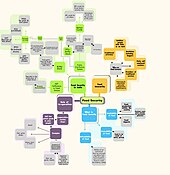| National Food Security Act, 2013 | |
|---|---|
 Food security and insecurity in India | |
| Government of India | |
| Enacted by | Government of India |
| Signed | 10 September 2013 |
| Status: In force | |
The National Food Security Act 2013, also known as Right to Food Act, is an Indian Act of Parliament which aims to provide subsidized food grains to approximately two thirds of the country's 1.4 billion people.[1] It was signed into law on 12 September 2013, retroactive to 5 July 2013.[2][3]
The National Food Security Act, 2013 (NFSA 2013) converts into legal entitlements for existing food security programmes of the Government of India. It includes the Midday Meal Scheme, Integrated Child Development Services scheme and the Public Distribution System. Further, the NFSA 2013 recognizes maternity entitlements. The Midday Meal Scheme and the Integrated Child Development Services Scheme are universal in nature whereas the PDS will reach about two-thirds of the population (75% in rural areas and 50% in urban areas).
Under the provisions of the Act, beneficiaries of the Public Distribution System (or, PDS) are entitled to 5 kilograms (11 lb) per person per month of cereals at the following prices:
- Rice at ₹3 (3.6¢ US) per kg
- Wheat at ₹2 (2.4¢ US) per kg
- Coarse grains (millet) at ₹1 (1.2¢ US) per kg.
Those with Antyodaya cards are entitled to 35 kg per month at the same prices as above.
The Act also includes the Mid Day Meal Scheme (MDM), the Integrated Child Development Services Scheme (ICDS) and maternity entitlements. While the MDM and ICDS were pre-existing schemes of the union government, universal maternity entitlements were created under the NFSA 2013 for the first time. In 2017, these entitlements were operationalized through the Pradhan Mantri Matru Vandana Yojana. Through the ICDS and MDM, pregnant women, lactating mothers, and children are eligible for daily free meals in government schools and anganwadi centres.
The bill was hotly debated before its introduction in Parliament and after it was introduced in Parliament. It was introduced into India's parliament on 22 December 2011, promulgated as a presidential ordinance on 5 July 2013, and enacted into law on 12 September 2013.[4][5] Government of Odisha announced implementation of the act in 14 district from 17 November 2015.[6] Government of Assam implemented the Act on 24 December 2015.[7]
- ^ "Govt defers promulgation of ordinance on Food Security Bill". Times of India. 13 June 2013.
- ^ "The National Food Security Bill, 2013 Receives the Assent of the President, Published in the Gazette of India as Act No. 20 of 2013" (Press release). Press Information Bureau.
- ^ "Food Security Act To Be Implemented From July 5". Bloomberg TV India. Archived from the original on 17 July 2014.
{{cite web}}: CS1 maint: unfit URL (link) - ^ "U.S. Department of Agriculture, New Delhi, India, Indian Cabinet Approves National Food Security Bill 2013, GAIN Report IN3037, 11 April 2013" (PDF). Archived from the original (PDF) on 4 March 2016. Retrieved 10 September 2013.
- ^ "National Food Security Ordinance, No. 7 of 2013, 5 July 2013" (PDF). Archived from the original (PDF) on 27 January 2018. Retrieved 10 September 2013.
- ^ "Odisha to implement Food Security Act in 14 districts". The Hindu. 17 September 2015. ISSN 0971-751X. Retrieved 22 November 2021.
- ^ "National Food Security Act in Assam from December 24". The Economic Times. 19 December 2015. Retrieved 22 November 2021.